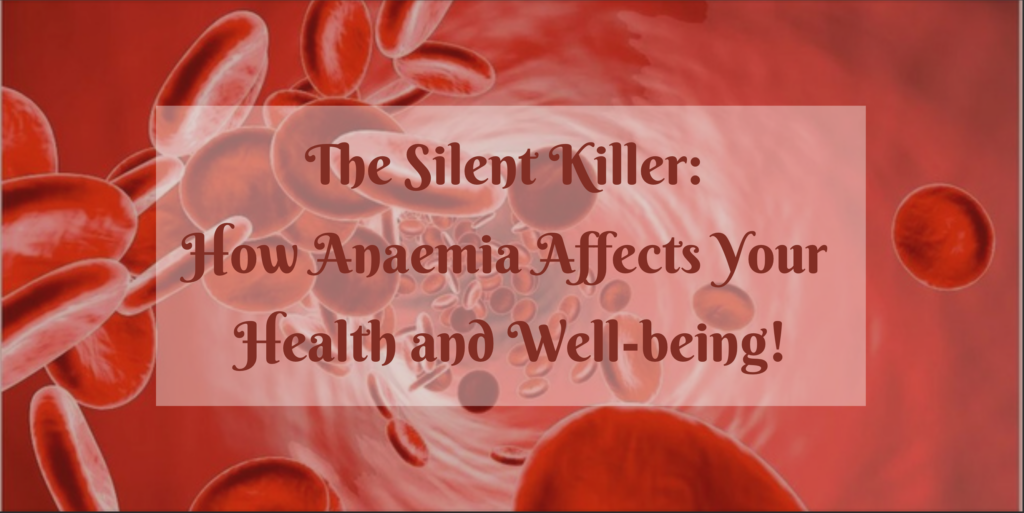Symptoms of Anaemia
Anaemia is a medical condition that arises when the body does not have enough red blood cells to carry oxygen to its tissues. There are various causes of this condition, including poor diet, blood loss, and underlying medical conditions. Despite being a common health issue, many people are unaware of their anaemia, as it can either be asymptomatic or present with mild symptoms. However, if left untreated, anaemia can lead to severe health complications like heart failure, chronic fatigue, and even death. The good news is that several natural remedies are available to manage and treat this condition.
In this article, we will delve into the Symptoms of Anaemia and discuss some effective natural ways to manage and treat it. By incorporating iron-rich foods, vitamin C, folic acid, and vitamin B12 into your diet, as well as engaging in regular exercise and stress-reducing activities, you can effectively manage and treat anaemia. It’s always advisable to seek medical advice if you suspect you have anaemia, as prompt intervention is essential for effective treatment.
Symptoms of Anaemia
Anaemia can present itself in various ways, depending on the severity and underlying cause. The most common Symptoms of Anaemia include:
- Fatigue and Weakness: It could be a sign of anaemia if you always feel tired and weak. This occurs because your body is not getting enough oxygen, leading to a feeling of fatigue and weakness.
- Pale Skin: Anaemia can cause your skin to appear pale or yellowish due to the lack of red blood cells.
- Shortness of Breath: Even after light exercise, you could feel out of breath; this could be an indication of anaemia. This happens as a result of your body not receiving enough oxygen to meet its requirements. This occurs because your body is not getting enough oxygen to meet its needs.
- Headaches and Dizziness: Anaemia can cause headaches, dizziness, and light-headedness due to the lack of oxygen supply to the brain.
- Chest Pain: Severe anaemia can cause chest pain and even heart failure due to the lack of oxygen supply to the heart.
Treating Anaemia Naturally
If you are looking for ways to alleviate the Symptoms of Anaemia, treating it naturally may be an effective option. By incorporating certain foods into your diet, engaging in regular exercise, and managing stress, you can manage and treat anaemia without relying solely on medication.
Natural remedies like consuming iron-rich foods, vitamin C, folic acid, and vitamin B12 can help restore the nutrients your body needs to function correctly. Here, we’ll explore some natural ways to treat anaemia and how to incorporate them into your lifestyle for effective symptom relief.
-
- Iron-Rich Foods: Iron is an essential mineral that is required to produce red blood cells. Eating an iron-rich diet can help increase your body’s red blood cell count. Iron-rich foods include leafy greens, beans, lentils, fortified cereals, and meat.
- Vitamin C: The body uses vitamin C to absorb iron from meals. Vitamin C-rich foods such as oranges, kiwis, strawberries, and broccoli can help increase iron absorption.
- Folic Acid: Folic acid is essential for producing red blood cells. Foods rich in folic acid include spinach, asparagus, lentils, and fortified cereals.
- Vitamin B12: Vitamin B12 is required to produce red blood cells. Meat, fish, eggs, and dairy products are high in vitamin B12. You may need to take a vitamin B12 supplement if you are a vegetarian or vegan.
- Exercise: Regular exercise can help increase the production of red blood cells and improve your body’s oxygen-carrying capacity. Try to engage in moderate physical activity for at least 30 minutes a day, five days a week.
- Reduce Stress: Stress can have a negative impact on the body’s immune system and lead to anaemia. Engaging in stress-reducing activities such as meditation, yoga, or deep breathing exercises can help improve your body’s overall health.
- Avoid Iron Blockers: Certain foods and beverages can block iron absorption in the body. These include tea, coffee, and dairy products. Avoiding or consuming these foods in moderation to increase your iron intake is best.
Conclusion
Anaemia is a medical condition that requires timely attention and treatment. If left untreated, it can lead to serious health problems. However, there are various natural methods through which you can manage and treat anaemia. Eating a diet rich in iron, vitamin C, folic acid, and vitamin B12 can help restore the necessary nutrients. Regular exercise and stress-reducing activities can significantly improve overall health and reduce anaemia symptoms.
You can effectively manage and treat anaemia by adopting and incorporating these natural remedies into your lifestyle. It’s always advisable to consult a healthcare professional if you suspect you’re suffering from anaemia. They can guide you on the best course of action and monitor your progress. Remember, taking proactive measures toward your health can go a long way in preventing anaemia and other health conditions.


